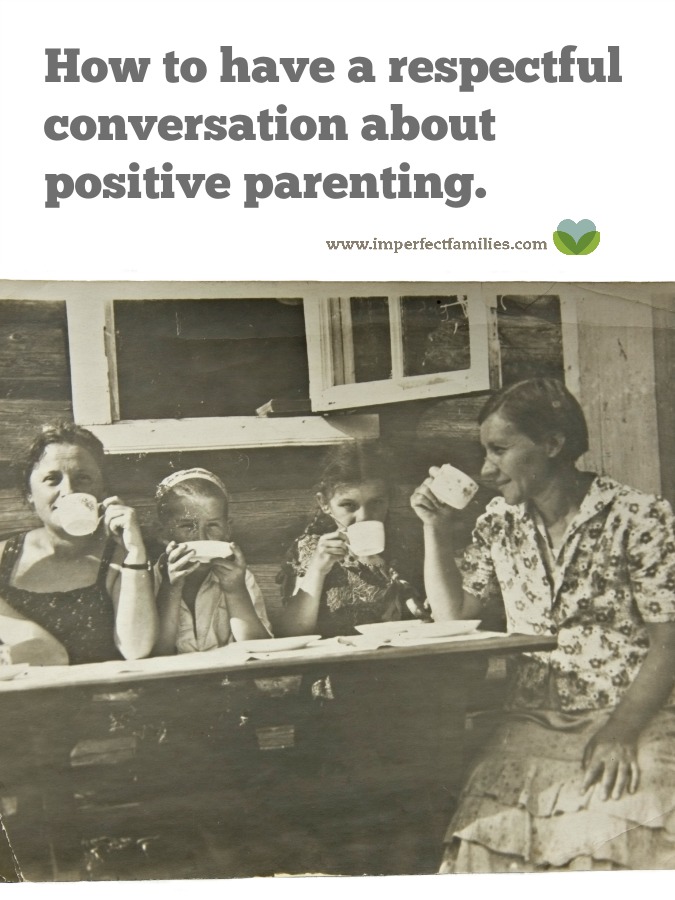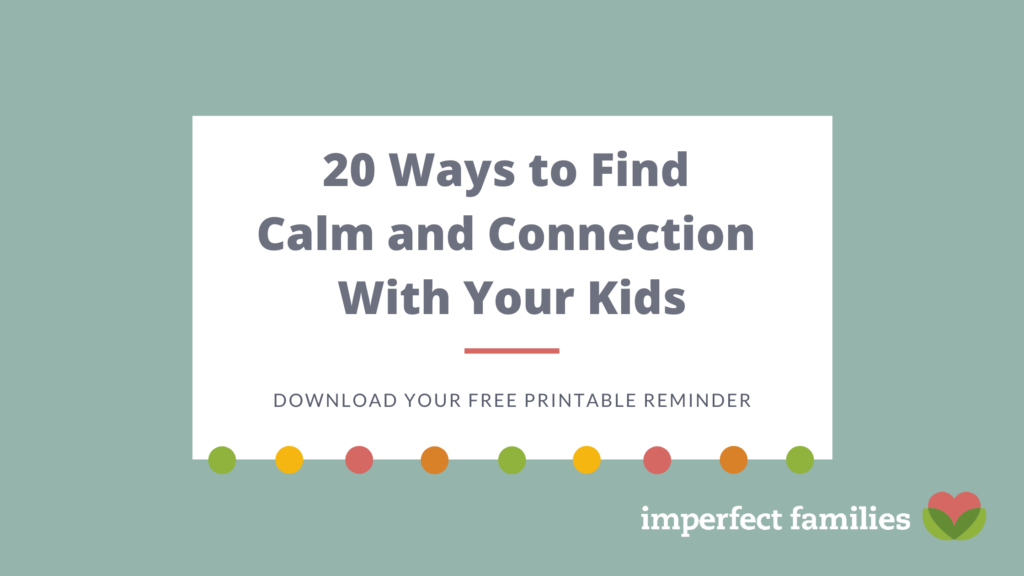Sharing your parenting philosophy and strategies with friends and family isn’t always an easy task. Here are 10 tips to help you have a respectful conversation about positive parenting – even if the other person doesn’t agree!

There’s nothing like a holiday party to bring on the hard conversations.
Your sister wonders why you don’t use timeouts. Your mother-in-law doesn’t understand why she can’t bribe the kids with candy.
It’s not that you’re embarrassed about your parenting decisions. It’s just that sometimes, it’s hard to put your perspective into words.
Plus, you don’t want to start an argument…especially before the pie is served.
So, what are your options?
Here are some tips for managing conversations about positive parenting during the holidays (or anytime!)
Tips for a respectful conversation about positive parenting
- Be honest. Rather than worrying about saying the right thing or doing the right thing, be true to yourself. It’s OK if you don’t feel 100% confident in your parenting decisions all the time. It’s OK to be learning and growing in your parenting. Don’t apologize for shifting your parenting strategies. “We’ve stopped using timeouts with Luke. We found they often made him more upset. Now, we use time-in’s, where we stay close until he is calm again.”
- Stay focused on your journey. You may believe in positive parenting with all your heart, and long for others to see things from your point of view, but nothing shuts down a conversation faster than a judgmental comment. If you find yourself pointing the finger or pointing out the flaws in another person’s parenting, it’s a good reminder to step back and focus on your own decisions.
- Listen. It’s easy to get defensive and abrasive when someone criticizes your parenting. Instead, take a deep breath and resist the urge to offer a snappy reply. Respectful communication starts with good listening. Be willing to hear the other person’s perspective first. Your job is not to convince them you’re right, but to have a productive conversation.
- Empathize. Once you’ve listened, you can formulate your initial response. But, before you give a comeback, let the other person know that you’ve heard their concerns. Even if you do not agree. Often, there are big feelings underneath their words – fear, confusion, inadequacy. Put their concerns into words. “It sounds like you’re worried he will take advantage of my attention. Is that right?”
- Keep it simple. If the other person is willing to continue the conversation, give a quick summary of your thoughts, what you’re learning, or what you’ve tried before. The goal isn’t to convince the other person, but to keep the conversation going. You don’t need fancy words or the “right” answer. “I was worried about that when I learned about this strategy too. It seemed really different than how we were raised. But, it’s really made a huge difference.”
- Focus on the long-term. Positive parenting is different because it looks at child development from a big-picture perspective. Self-regulation doesn’t happen overnight. It is a slow, often rocky, process. Children are unique, their brains develop at different rates, they struggle with different feelings and behaviors. It’s not a one-size-fits-all philosophy. “It would be great to get those tantrums to stop immediately, but we’re more concerned about helping him identify why he’s feeling that way and how to manage it next time.”
- Talk about success cautiously. It’s great to have a few success stories to share with people who ask about your parenting strategies. However, perfect parents and perfect children are not the end goal. Both you and your kids will struggle from time to time. That’s part of being human. It’s OK to admit struggles and imperfections along with the progress and success stories. “It’s been a learning curve for sure. I can’t say I’m always calm when he’s upset, but it’s way easier than it was at first.”
- Offer resources, but don’t force it. If the other person is interested, be willing to share websites, blogs, or articles that were helpful on your journey. If they aren’t interested right now, keep the conversation open for future conversations.
- Be assertive. Just like parenting, work to find a middle ground between aggressive and passive. It’s easy to fall back into old communication patterns, especially with our family of origin. If you tend to be more passive, take a deep breath, roll your shoulders back, and stand up straight. If you tend to be more aggressive, sit down to have these conversations or get below the other person’s eye level, keep your arms open instead of crossed.
- Know when to step away. There are times when a productive, respectful conversation is impossible. Your mental health is important. It’s OK to excuse yourself or refuse to continue a conversation – especially one that is unhealthy or disrespectful. Changing communication patterns is challenging, and may take the support of a mental health professional to move forward.
It’s OK if you all disagree. It’s OK if you don’t quite convince your sister to drop the time outs. And it’s OK if you still notice your mom handing out Skittles behind your back. The point is that you started a conversation. You’ve started the ball rolling. You did your part to have a respectful parenting conversation.
And someday, you may be able to pick up where you left off.
But for now, enjoy the pie.
How can I help?
If the thought of having one of these conversations makes you feel stressed, uneasy or overwhelmed, let’s talk! Setting up an online parent coaching session gives you the opportunity to talk through your concerns and find a solution that feels right to you, and works for your unique family. Learn more and schedule a session today!



Comments have been turned off to retain the privacy of all families. If you have a question or comment on the topic, you're always welcome to contact me.